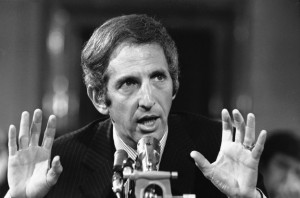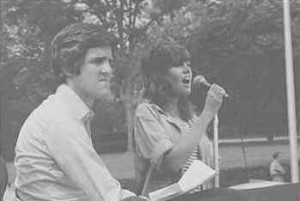40 years of walking in desert in search of democracy
It happened 40 years ago – in 1973. There was a break-in at the Democratic National Committee headquarters at the Watergate office complex in Washington D.C. to install tapping devices so that Republican President Richard Nixon could monitor communications of Democratic presidential candidate George McGovern. Back then the trial lasted for almost two years and ended up in President Nixon’s resignation to avoid the impeachment procedures. The Americans and the world were told nothing like this would ever happen again, the historic lessons were supposed to be drawn, the events in general showed democracy won and was deeply enrooted in American society. The time period from those days up to now is comparable with the time Moses needed to make slavery leave the memory of his people who walked in desert. Since Watergate the illegal interference of state into the lives of Americans and other people in different countries has increased by leaps and bounds. All high-tech achievements are used for the purpose. There is another aspect here, which makes the two stories differ. No matter how hard Nixon and his entourage tried to conceal the wrongdoing, there was a chance from the very start that the investigation would go the whole hog to the logical end because the perpetrators infringed on the interests of mighty Democratic Party establishment. Now the revelations, called Snowdengate after the name of the person who started it, by far exceeds Watergate in scope and importance. «Crucify him!» – the voices are heard everywhere across the nation. It’s not ruling Democrats only who adopt this stand. The Republicans join the choir; they have done a lot to make PRISM functionable. Freedom happens to exist only for the limited circle of the bipartisan leadership while others have to be subject to omnipresent and watchful eagle eye. The consensus is reached.

Glenn Greenwald of the Guardian thinks the US government treats the critics and whistleblowers the same way it treated Daniel Ellsberg who wrote «History of United States Decision-Making Process on Vietnam Policy, 1945–1967». In late 1969 Ellsberg secretly made several sets of photocopies of the classified documents to which he had access; these later became known as the Pentagon Papers made public in 1971. They revealed that the government had knowledge, early on, that the war could most likely not be won, and that continuing the war would lead to many times more casualties than had ever been admitted publicly. Daniel Ellsberg faced total possible sentence of 115 years. The fact that the evidence against him was gathered while breaching legal procedures (illegal wiretapping and searches) gave rise to strong public support for him and his cause. He was acquitted. The first Watergate reaction was by and large similar and it clearly repeats itself in the case of Snowden. According to Greenwald, there is a similarity in the cases of US whistleblowers:
1. They come under attacks and are demonized by the government to distract public attention from state committed violations, as well undermine whistleblowers’ credibility making their revelations look like minor, unimportant things.
2. In all cases officials react simultaneously and behave like a puppet on a string, they start to intimidate and threaten all those who have relation to disclosures. For instance, fact-finding investigation is on the way to check the activities of companies that had put Snowden on pay-roll and make precise who and how had given Ed Snowden the clearance allowing access to classified information.
There is one more similarity here. Like the whistleblowers before him, Snowden pursued no personal gains. Moreover, all these people have made disclosures conscientiously in an attempt to make the government become more democratic, responsible and accountable.
But in the past Washington has never exerted such an unprecedented pressure on foreign leaders, including direct threats. This attitude is in contrast with logic. For instance, the White House demands from Russia what it has many a time refused to do in its turn upon receiving requests from this country, including the days of President Obama’s tenure. Traitor Poteev received honorable welcome and even was paid well. So why this irrational reaction, almost paranoia, when it comes to Snowden? Or Gods may do what cattle may not? The Snowden’s revelations produce few secrets not known to other secret services. There have been much more damaging things becoming public domain, but no such ballyhoo has ever been raised. No technical details, no individual names have surfaced, Snowden appears to have no intention to do it. But there is something else. He destroyed the deeply enrooted myth about US struggle, including the Obama’s administration, aimed at freedom for all. The global crusade to protect democracy has turned into global eavesdropping and monitoring. PRISM looks like the pervading big brother from the Orwell’s 1984. The disclosures has also inflicted great damage on IT Microsoft, Google, Yahoo, Facebook, YouTube, Skype, AOL, Apple and others. These companies suffer financial losses their reputations are undermined. That’s why, no matter all the evidence produced, they stubbornly refuse to admit the fact of close cooperation with US special services giving away the information on clients.
The main difference between Snowdengate and Watergate is that back then it was one political party conducting subversive actions against the rival, now the two are together violating people’s privacy worldwide. The snooping takes place no matter who is in power, it has flourished during the Obama’s tenure matching well with and becoming an element of his «soft power» strategy. It has intensified to larger extent in comparison with the time there was less talk about democracy. Hypocrisy and duplicity have dominated the scene, something Snowden could not stand anymore.
In 2008 Obama, a presidential hopeful, championed the cause of government transparency, and spoke admiringly of whistle-blowers, whom he described as «often the best source of information about waste, fraud, and abuse in government». He pointed out back then that «Such acts of courage and patriotism… should be encouraged rather than stifled» meaning the Bush Jr. record. Some estimates say the number of lawsuits against whistleblowers has increased twice while Obama is power in comparison with the record of all his predecessors taken together. The conversion of Paul, the Apostle, into Saul can be reversed as it happens. It’s a tragedy for Snowden that he sincerely believed the words of his country’s leaders, then rude awakening came and he felt deep frustration. They try to make him look like a half – educated person and an infantile juvenile. In reality he is surprisingly reasonable and is a man of principle and strong character. At his thirty he is hardly adolescent. The man has gone through hard times and always stood tall. He belongs to American idealists who threw the decorations at the White House to protest the Vietnam War and demanded Nixon to be impeached no matter how hard the former President tried to avoid it.

State Secretary John Kerry, who is so indignant today demanding the Snowden’s extradition and even threatening Moscow, could remember his youth days when being decorated during the Vietnam war, he actively protested the bloody adventure. Daniel Ellsberg was kind of a Messiah for him then. So what has happened to change Mr. Kerry now? Has he grown out of protest age? Are the youth ideals left far behind? Are the interests of Empire the only things that matter for him?
Back in 2003 Edward Snowden enlisted for Army to receive training for Special Operations Forces and to go to Iraq because «I felt like I had an obligation as a human being to help free people from oppression», he said. He broke the both legs and did not go to war. A son of his country grown influenced by its propaganda he sincerely believed in the «noble mission» of freedom. Actually, that’s what he is doing, these are the things he has been taught and called upon to do, and he’s doing it all honestly. Being gifted, he rapidly moved up in ranks having joined the CIA and was getting ahead of those who formally had higher education diplomas. One «formative» incident occurred around 2007, when the young technical analyst was working for the CIA under diplomatic cover in Geneva, Switzerland. It involved a Swiss banker. CIA operatives were attempting to recruit a Swiss banker to obtain secret banking information. Snowden said they achieved this by purposely getting the banker drunk and encouraging him to drive home in his car. When the banker was arrested for drunk driving, the undercover agent seeking to befriend him offered to help, and a bond was formed that led to successful recruitment. «Much of what I saw in Geneva really disillusioned me about how my government functions and what its impact is in the world,» he says. «I realized that I was part of something that was doing far more harm than good». Snowden says he thought about leaking government documents during his CIA stint in Geneva but refrained for fear that these secrets could endanger people, not machines and systems, and because he was hopeful about the election of Barack Obama. He became disappointed that many of Obama’s campaign promises had not been realized and the situation even worsened. He did not ask the Guardian neither for protection, nor anonymity. «I have no intention of hiding who I am because I know I have done nothing wrong». he said. Despite his determination to be publicly unveiled, he repeatedly insisted that he wants to avoid the media spotlight. «I don’t want public attention because I don’t want the story to be about me. I want it to be about what the US government is doing». He does not fear the consequences of going public, he said, only that doing so will distract attention from the issues raised by his disclosures. «I know the media likes to personalize political debates, and I know the government will demonize me». Despite these fears, he remained hopeful his outing will not divert attention from the substance of his disclosures. «I really want the focus to be on these documents and the debate which I hope this will trigger among citizens around the globe about what kind of world we want to live in». He added: «My sole motive is to inform the public as to that which is done in their name and that which is done against them». He has had «a very comfortable life» that included a salary of roughly $200,000, a girlfriend with whom he shared a home in Hawaii, a stable career, and a family he loves. «I’m willing to sacrifice all of that because I can’t in good conscience allow the US government to destroy privacy, internet freedom and basic liberties for people around the world with this massive surveillance machine they’re secretly building». Snowden is worried about his next of kin and friends, «My primary fear is that they will come after my family, my friends, my partner. Anyone I have a relationship with… I will have to live with that for the rest of my life. I am not going to be able to communicate with them. They [the authorities] will act aggressively against anyone who has known me. That keeps me up at night». He says he has no idea of what will happen in future, he wants to see his house very much but doesn’t hope it will happen, «I think the sense of outrage that has been expressed is justified. It has given me hope that, no matter what happens to me, the outcome will be positive for America. I do not expect to see home again, though that is what I want»…
Source: Strategic Culture Foundation















Comments